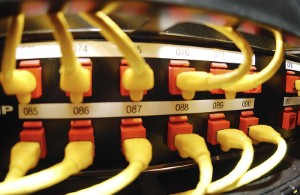
Firewalls on the front line of cyber defense
By admin on October 13, 2011
The Department of Homeland Security (DHS) has declared October National Cyber Security Awareness Month. In the ongoing 21st century war against computer hackers, one of the first lines of defense is a strong firewall. Networks that lack a firewall may be more vulnerable to attacks by malware, which could require a spyware removal expert to remove.
Generally used in conjunction with anti-virus and anti-spyware software, firewalls control a computer's internet connection, acting as a filter that monitors communications flow and blocks potentially harmful transmissions.
Firewalls are typically deployed by businesses that want to control network traffic to and from their company servers. On a smaller scale, personal firewalls can also put in place by individuals who are concerned about securing data in their own networks.
Most firewall programs alerts a user when an attempted breach has occurred and provides the user with options as to how he or she would wish to proceed. Users can also modify firewall settings to allow certain transmissions.
A common criticism of firewalls is that if they are somehow compromised, they can be manipulated by any malware, rendering them essentially useless until the malware can be removed.
DHS declares that the greatest threats toward American progress in the 21st century are cyber threats, which are so widespread that ultimately users must take responsibility for their own internet usage and protect their own computers.
A Washington, D.C. spyware removal location can help a user install firewall software, remove any malware that has broken through an existing firewall or remove malware that had entered the computer before the firewall was instituted. Firewall software generally costs about $50 and user reviews are readily available online.
For a Free Computer Repair Quote Call (202) 670-9966
Related Spyware Removal Articles
Password security is getting slacker, study showsGoogle asks companies to stop helping pirates
Olympic scam sites named by tech blog
Summer Olympic fans may be prime targets for hackers, says report
Can My Mac Get a Virus?



Leave a Reply